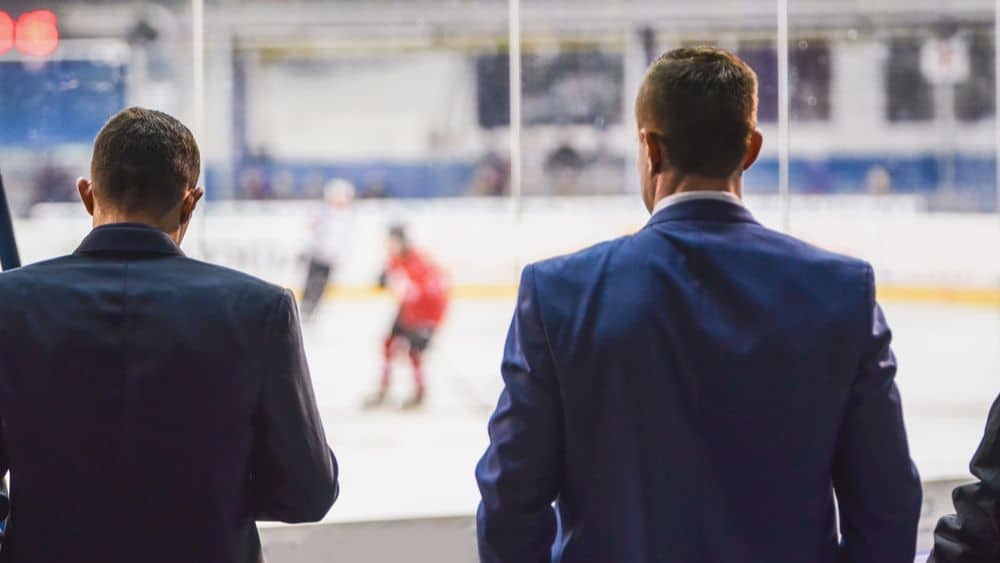
If you’re passionate about the sport and wondering how to get a job in hockey, there are more options than you might think. From coaching and scouting to media, team operations, and front-office roles, jobs in hockey span far beyond what happens on the ice. Whether you’re aiming for a position with a local team or one of the competitive NHL hockey jobs, the right steps can help you turn your interest into a long-term career.
As hockey leagues continue to grow, so does the demand for skilled professionals. Teams at all levels are looking for coaches, trainers, equipment staff, marketing experts, and managers who understand the game and know how to support athletes and organizations.
This guide will break down the different types of hockey jobs available and explain what you need to qualify, where to look, and how to stand out. Whether you’re new to the sport or already have experience, it will help you take practical steps toward building a successful career in hockey.
Types of Hockey Jobs Available
There’s more than one way to build a career in hockey. While coaching is a well-known path, many professionals also work behind the scenes in areas like team operations, media, fitness, and business support.
Whether you’re interested in being on the bench or contributing off the ice, the hockey industry offers a wide range of roles for different skills and interests.
Here’s a closer look at some of the most common jobs in hockey today.
Hockey Coaching Jobs
One of the most common jobs in hockey is coaching. Coaches are needed at every level, including youth programs, high schools, colleges, minor leagues, and professional teams. These roles involve planning practices, building team strategies, and helping players improve their performance.
Hockey coaching jobs require a solid understanding of the sport, leadership skills, and the ability to teach and communicate well with athletes.
Coaches often start by helping with local teams or volunteering with community programs. This helps build experience and a reputation that can lead to higher-level roles. Over time, coaches may move up from local leagues to more competitive positions within college or professional hockey.
Ice Hockey Coaching Jobs
If you’re explicitly focused on ice hockey coaching jobs, you’ll likely need specific certifications. Most leagues in the United States require coaches to complete USA Hockey’s certification program. In Canada, Hockey Canada offers similar coaching levels.
These certifications prove you understand safety rules, teaching methods, and how to guide players on and off the ice.
Starting as an assistant or helping with a youth hockey team is a common first step. With experience, training, and the right attitude, coaches can work in more competitive leagues or even professional roles over time.
NHL Hockey Jobs and National Hockey League Jobs
Many people are interested in working at the highest level of the sport. NHL hockey jobs and other national hockey league jobs include many positions outside of coaching.
Teams hire scouts to evaluate players, front-office workers to manage contracts and team budgets, media teams to handle interviews and press releases, and operations staff to handle game-day needs.
Because these roles are part of the National Hockey League, they’re very competitive. Most NHL jobs go to people who already have substantial experience in hockey or have worked in other leagues first. Building your career in more minor leagues or college hockey can be a good way to work toward a position in the NHL.
Hockey Manager Jobs

Hockey manager jobs focus on the behind-the-scenes parts of running a team. A manager may help plan travel, organize schedules, work with coaches, and handle team logistics. At the professional level, general managers often deal with player contracts and big-picture planning.
Becoming a manager helps to have a background in business, sports management, or administration. Many hockey managers begin with smaller teams, where they can take on multiple tasks and gain the skills needed to move up. Strong organization, communication, and leadership are key to success in these roles.
Other Jobs in Hockey
Not every role in hockey involves coaching or managing a team. There are plenty of other ways to be part of the sport, especially for those with skills in communication, fitness, or organization.
Common jobs in hockey beyond coaching include:
- Sports journalists who cover games, write articles, and interview players
- Strength and conditioning coaches who help athletes train, stay in shape, and recover from injuries
- Equipment managers who make sure players have the gear they need for practices and games
- Social media coordinators who run team accounts and keep fans engaged
- Marketing and public relations staff who handle team promotion, sponsorships, and press releases
- Event planners who help organize game-day experiences and team functions
These roles are great for people who love hockey and want to contribute in areas like media, health, or business. Having experience in these fields—along with a strong understanding of the sport—can help you stand out when applying for hockey jobs.
How to Qualify for Hockey Jobs
Most jobs in hockey require a mix of education, hands-on experience, and sometimes specific certifications. What you’ll need depends on the type of role you’re aiming for. Here are some key points to consider:
- Different roles require different qualifications: it’s essential to understand what’s expected for the specific job you want.
- Entry-level positions may be open to beginners, especially in smaller leagues or local programs.
- Higher-level NHL or college hockey jobs usually expect more experience and formal training.
- Education, certifications, and related experience can help you stand out when applying.
- Matching your background to the job’s requirements—whether it’s in coaching, media, operations, or fitness—will improve your chances of getting hired.
- Understanding how to get a job in hockey starts with knowing the path for the role you’re interested in and taking steps to build your qualifications accordingly.
Education and Certifications
Some roles, like coaching or team management, may require a college degree. Sports management, business, communications, or physical education are common majors for people working in hockey. For coaching, official certifications are often required. Programs from USA Hockey or Hockey Canada teach the skills and safety rules needed to lead a team properly.
Even if a degree isn’t required, training programs and certifications show that you’re serious about your career and willing to learn.
Skills and Experience
Playing experience helps a lot when applying for hockey-related jobs. Even if you didn’t play at a high level, time spent on the ice gives you an edge when working with athletes or coaching teams. For media or fitness roles, experience in writing, video editing, or physical training is also valuable.
Interning with a team, volunteering, or working in a support role can help build the experience you need to move forward.
Networking in the Hockey Industry
Knowing the right people can open many doors. Reaching out to professionals in the industry, attending coaching clinics or hockey camps, and joining online platforms like LinkedIn can help you learn about job openings and get recommendations.
Talking with coaches, team staff, or former players can give you advice and insight into how to get a job in hockey. Building relationships is just as important as sending in your resume.
Finding Hockey Jobs: Where to Look
After you’ve worked on your education, experience, and connections, it’s time to start searching for jobs in hockey. Whether you’re looking for coaching, media, scouting, or operations work, there are several reliable places to begin.
The easiest place to start is online. Job boards like JobsInSports.com specialize in sports positions and are a go-to source for people looking for hockey coaching jobs, NHL hockey jobs, and more. You can search by location, experience level, and job type.
Online Job Portals
If you’re looking for hockey jobs, JobsInSports.com is one of the best places to begin your search. The site focuses entirely on jobs in sports, including hockey coaching jobs, media roles, and front-office positions. Whether you’re interested in local youth programs or aiming for national hockey league jobs, JobsInSports makes it easier to find openings that match your experience and goals.
You can search by job type, location, or level of play, making it simple to focus on the hockey positions that fit your path. With regularly updated listings and tools to support your job hunt, JobsInSports is a valuable resource for anyone trying to get a job in hockey.
NHL Career Opportunities
Check their official websites if you want to work with an NHL team. Most teams have a careers section where they post job listings. NHL.com may also include updates and links to job openings across the league.
Whether looking for entry-level roles or something more advanced, applying through team websites is often the most direct path to national hockey league jobs.
How to Stand Out When Applying for Hockey Jobs
Once you find a job listing that matches your skills, the next step is applying in a way that helps you get noticed. Since hockey jobs often attract many applicants, small details in your application can make a big difference.
Resume and Job Interviews
Your resume should clearly show your experience, certifications, and hockey-related skills. Include any volunteer work, internships, or coaching roles you’ve done. Keep it simple, clean, and focused on results—like how you helped improve a team or led training sessions.
When interviewing, be ready to talk about your knowledge of the game and why you’re a good fit for the role. Practice common questions and be honest about your strengths and experience.
Leveraging Internships and Volunteering
If you don’t have much experience yet, internships and volunteering are the best ways to prove that you’re serious about working in hockey. Start with local programs, high schools, or community rinks. Offer to help with coaching, managing equipment, filming games, or writing team updates.
These early roles may not pay, but they help you build experience and relationships. Teams often hire people they’ve seen show up, work hard, and support the team. Volunteering can be a direct path to part-time or full-time positions.
You don’t need to wait for an official internship listing, either. Contact local teams and ask if they need help. Show interest, be reliable, and treat every small job like it matters—because it does.
Common Challenges in Getting a Job in Hockey
Breaking into the hockey industry isn’t always easy. There are several common challenges that job seekers may face, including:
- Limited job openings, especially in professional leagues like the NHL
- High competition for most roles, even at the entry level
- The need to relocate for specific jobs, which can be difficult for some people
- Starting at a lower level, such as youth or minor league hockey, before moving up
- Lack of connections or networking opportunities when first starting out
- Balancing unpaid internships or volunteer roles while gaining experience
Even with these obstacles, people who stay focused, build their skills, and take every opportunity to learn often find their way into the industry. Starting small doesn’t mean staying small—every role helps you move closer to your goals.
Find Hockey Jobs with JobsInSports

If you’re serious about building a future in hockey, JobsInSports.com is one of the best places to begin. The site offers one of North America’s most extensive collections of hockey job listings. Whether you’re looking for entry-level hockey coaching jobs, ice hockey coaching jobs in college or junior leagues, or aiming for national hockey league jobs with an NHL team, there’s something for everyone.
For anyone exploring jobs in hockey—from players and coaches to managers and media professionals—JobsInSports.com is a valuable tool. It’s a place where your passion for hockey can meet real job opportunities, no matter where you’re starting from.





